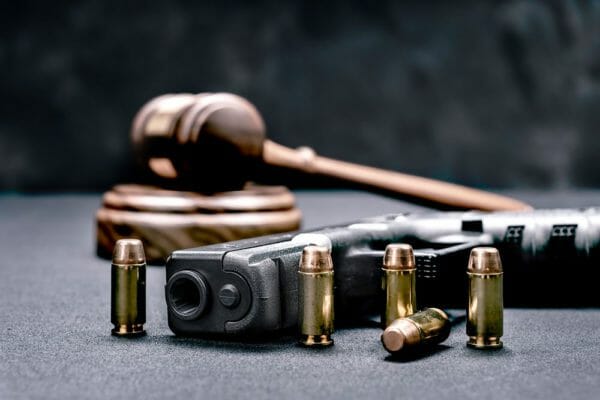
U.S.A. — Umbert v. United States, a case that began in 2018 against the Department of Justice and Federal Bureau of Investigation, has finally been dismissed as “moot” due to the government reversing its decisions to unlawfully deny firearms to citizens by a June 7 Memorandum Opinion in the United States District Court for the District of Columbia.
The case centers on individuals not being allowed to appeal background check denials due to the FBI not processing them.
A self-created Catch-22 ensured corrections could not be made and National Instant Criminal Background Check System (NICS) examiners were denied access to the FBI-administered National Data Exchange (N-DEx) system, a comprehensive federal database that contains over 500 million criminal justice records. To further illustrate the ludicrousness of deliberately indifferent bureaucrats, per the complaint, the NICS and N-Dex systems are located in the same building!
Some of the other plaintiffs had prior criminal records, but they had been cleared. Per United States Code, that means:
“Any conviction which has been expunged, or set aside or for which a person has been pardoned or has had civil rights restored shall not be considered a conviction for purposes of this chapter, unless such pardon, expungement, or restoration of civil rights expressly provides that the person may not ship, transport, possess, or receive firearms.”
“After we sued, a number of plaintiffs were cleared and thus, allowed to purchase firearms,” attorney Stephen Stamboulieh told AmmoLand News. “For the NFA denials, the FBI cleared those plaintiffs’ history, and the ATF refunded their money.
“The LeComte plaintiff was probably the most egregious one, as the FBI claimed for years that Mr. LeComte’s conviction for writing on a public bathroom wall in the 1970s was potentially prohibiting,” Stamboulieh elaborated. “Then when we cleared that up, the FBI claimed that a fight that he had with his best friend back in the 1970s could also be prohibiting, because the FBI did not know if that was domestic violence. After we filed for summary judgment, including an affidavit from both Mr. LeComte and his wife, that it wasn’t a domestic because he and his friend never dated, and didn’t have children together. The FBI then cleared Mr. LeComte. It was a mess.”
“Plaintiffs ask the court to order Defendants to (1) correct Plaintiffs’ records so that they are no longer barred from purchasing, receiving, or possessing firearms; (2) permit the transfer of Plaintiffs’ firearms; and (3) issue each Plaintiff a Unique Personal Identification Number (“UPIN”),” the Memorandum by United States District Judge Tanya S. Chutkan recounts. “Plaintiffs also seek declaratory judgment against Defendants, injunctive relief against continued violations of the law, and an award of attorney costs and fees. Because Defendants have provided the injunctive relief that Plaintiffs seek, this action is now moot.”
“So, why is this happening in 2023 when we filed the lawsuit in 2018?” Stamboulieh rhetorically asked. “It just takes a long time, apparently, and since the FBI cleared my plaintiffs, there was nothing else for the Court to do, and because the Court did not have to force the FBI to do anything (the FBI did it voluntarily after getting sued), I could not seek attorneys’ fees from the government.”
“Essentially, the case is moot and that is what the Order explains. This case cost us about 150K in lost attorneys’ fees since the FBI moved to clear our plaintiffs and made sure that we would never be considered the prevailing party,’ Stamboulieh explained. “It is atrocious and that is why Congress should amend 18 USC 925A to where if you have to hire an attorney to sue the FBI to fix your records to buy a firearm, as soon as you sue them and they fix your records, it should qualify you for attorneys’ fees. At that point, I think we would see a lot less erroneous denials if the FBI actually had to pay every time it was sued for an erroneous denial.”
Not amending the law and not creating an incentive to fix errors does one other thing those who would deny the right of the people to keep and bear arms are counting on: It creates a chilling effect on filing complaints in the first place and makes denial of justice painless to the oppressors and painful to those petitioning to have their rights recognized.
Who wants to spend years and substantial effort to force a correction and not even be able to recover costs? Who has those kinds of resources?
The answer is the government does, and that really brings to light the arrogant obnoxiousness of U.S. attorneys who dismissed and disparaged the efforts of a group of colleagues who have joined together in other legal actions designed to advance the right to keep and bear arms, particularly involving Freedom of Information Act requests and complaints if the recipient agencies are not responsive. U.S. Attorneys (Channing D. Phillips, Daniel Van Horn, and Joshua M. Kolsky) could not have made a snottier allegation in a footnote in the government’s Opposition to a Motion for Attorneys’ Fees and Costs:
“Plaintiff has represented himself in FOIA litigation previously, see Hardy v. DOJ, No. 98-27 (D. Az.), and is currently representing other plaintiffs in separate FOIA litigation against ATF pending before this Court, see Codrea v. ATF, No. 15-988-BAH (D.D.C.). Plaintiff would be barred from recovering fees had he represented himself in this case, see Nat’l Sec. Counselors v. CIA, 811 F.3d 22, 28 (D.C. Cir. 2016), so he retained attorneys Stephen Stamboulieh and Alan Beck. Mr. Stamboulieh submitted a declaration in support of the attorney’s fee request in the Codrea litigation, see Codrea, No. 15-988, Dkt. No. 28-1, and he is currently representing one of the Codrea plaintiffs in yet another FOIA suit against ATF, Savage v. ATF, No. 16-1212 (D.D.C.). In short, there is a tangled web of connections between a small cadre of firearms activists and their efforts to recover fees through largely unsuccessful FOIA litigation.”
Yeah, a tangled web. That’s rich coming from career bureaucratic trough feeders with a virtually unlimited supply of tax plunder to apply to the subversive task of denying rights to their countrymen at the behest of their political masters.
“He has erected a multitude of New Offices, and sent hither swarms of Officers to harass our people, and eat out their substance” was considered intolerable by the signers of the Declaration of Independence.
Meanwhile, after years of hard and exacting work, plaintiff attorneys get minimal costs if they’re lucky and plaintiffs get no recovery — by law — and these are all people doing it on principle, not because it’s personally lucrative. Case in point, the Umbert case, with the judge’s Memorandum, below:
About David Codrea:
David Codrea is the winner of multiple journalist awards for investigating/defending the RKBA and a long-time gun owner rights advocate who defiantly challenges the folly of citizen disarmament. He blogs at “The War on Guns: Notes from the Resistance,” is a regularly featured contributor to Firearms News, and posts on Twitter: @dcodrea and Facebook.

from https://ift.tt/kgyhOo6
via IFTTT

No comments:
Post a Comment